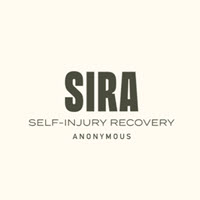12 step fellowship for recovery from self-injury. The mission of Self Injury Recovery Anonymous is to provide a safe space for individuals who engage in physical self-injury to come together to share experiences, strength, and hope without judgment or criticism. Together, they deepen our understanding of their behaviors and triggers and work within the framework of our program to help themselves and each other on their path to freedom. The only requirement for membership is a desire to stop injuring oneself physically.
They are a group of people who have found emotional and physical release in cutting, scratching, burning, picking, hair-pulling, cuticle shredding, and other behaviors that cause injury to themselves. They engage in these behaviors because they crave the release they bring and have not yet learned the skills to process their emotional experiences in a more constructive way. There is no typical self-mutilator, but many of them are self-described “people pleasers” with a tendency to act one way and feel another. They generally blame themselves for their problems and find it difficult to forgive themselves for their scars. Although the ‘addiction’ that they identify is not the dependence on substances that members of other fellowships seek out, they suspect that there are neurological and chemical phenomena at play when they self-soothe by injuring themselves at times of intense emotional distress. As they tell their stories and start to heal, many of them go through a phase of heightened anxiety, feeling the loss of their self-injurious habits as a loss of relationship with some “other.” There is great relief in sharing these reactions to healing, and those who have been “free” for a sustained period enjoy a sense of identity that is stable and healthy. Listening to those who have achieved real liberation describe the peace they have found in the program inspires us to continue on the difficult road to recovery.
They do not self-injure because they are trying to end their lives. They don’t get sexual satisfaction out of self-injury, or consider self-injury as an art-form. Although they tend to come from families and environments in which there are certain kinds of problems, and although they believe that recognizing these early patterns is an important part of their recovery, they are not focused on blaming others. They believe that each of us has a choice and can, with help, find freedom from self-mutilation and alternative ways to deal with interpersonal pain.

